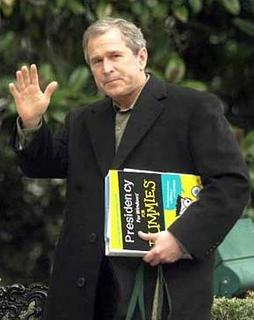
"When freedom takes hold, men and women turn to the peaceful pursuit of a better life. American values, and American interests, lead in the same direction" -President G.W. Bush
A comprehensive site with News, Documents, videos, links and commentary (inside and outside) on the news about the War in Iraq.
Borrowed from: Baghdad Burning
http://riverbendblog.blogspot.com/2005_02_01_riverbendblog_archive.html"
... I'll meet you 'round the bend my friend, where hearts can heal and souls can mend...
Saturday, February 12, 2005
The elections have come and gone.
The day of elections was a day of eerie silence punctuated by a few strong explosions and the hum of helicopters above. We remained at home and watched the situation on tv. E. left for about an hour to see what was happening at the local polling area, which was a secondary school nearby. He said there were maybe 50 people at the school and a lot of them looked like they were involved with the local electoral committee.
The polling station near our house was actually being guarded by SCIRI people (Badir’s Brigade). It was like an voting marathon for all of the news channels- everywhere you turned there was news of the elections. CNN, Euronews, BBC, Jazeera, Arabia, LBC… everyone was talking elections. The Arab news channels were focusing largely on voting abroad while CNN kept showing footage from the southern provinces and the northern ones. I literally had chills going up and down my spine as I watched Abdul Aziz Al Hakeem of Iranian-inclined SCIRI dropping his ballot into a box. Behind him, giving moral support and her vote, was what I can only guess to be his wife. She was shrouded literally from head to foot and only her eyes peeped out of the endless sea of black. She stuffed her ballot in the box with black-gloved hands and submissively followed a very confident Hakeem. E. turned to me with a smile and a wink, “That might be you in a couple of years…” I promptly threw a sofa cushion at him.
Most of our acquaintances (Sunni and Shia) didn’t vote. My cousin, who is Shia, didn’t vote because he felt he didn’t really have ‘representation’ on the lists, as he called it. I laughed when he said that, “But you have your pick of at least 40 different Shia parties!” I teased, winking at his wife. I understood what he meant though. He’s a secular, educated, non-occupation Iraqi before he’s Sunni or Shia- he’s more concerned with having someone who wants to end the occupation than someone Shia.
We’re hearing about various strange happenings at different voting areas. They say that several areas in northern Iraq (some Assyrian and other Christian areas) weren’t allowed to vote. They also say that 300 different ballot boxes from all over the country were disqualified (mainly from Mosul) because a large number of the vote ballots had “Saddam” written on them. In other areas there’s talk of Badir’s Brigade people having bought the ballots to vote, and while the people of Falloojeh weren’t allowed to vote, people say that the identities of Falloojans were temporarily ‘borrowed’ for voting purposes. The stories are endless.
In spite of that, we’re all watching for the results carefully. When the ‘elected’ government takes control, will they set a timetable for American withdrawal? That would be a shocker considering none of the current parties would be able to remain in power without being forcefully backed by America with tanks and troops. We hear American politicians repeatedly saying that America will not withdraw until Iraq can secure itself. When will that happen? Our current National Guard or “Haress il Watani” are fondly called “Haress il Wathani” or “Infidel Guard” by people in the streets. On top of it all, to be one of them is considered such a disgrace by the general population that they have to wear masks so that none of them can be identified by neighbors and friends.
The results won’t really matter when so many people boycotted the elections
No matter what the number say, the reality of the situation is that there are millions of Iraqis who will refuse to submit to an occupation government. After almost two years of occupation, and miserable living conditions, we want our country back. I do have my moments of weakness though, when I wonder who will be allowed to have power. Politicians are talking about a balance that might arise from a Shia, Kurdish alliance and it makes a lot of sense in theory. In theory, the Kurdish leaders are Sunni and secular and the Shia leaders are, well, they’re not exactly secular. If they get along, things should work out evenly. That looks good on blogs and on paper. Reality is quite different. Reality is that the Kurdish leaders are more concerned about their own autonomy and as long as the Kurdish north remains secular, the rest of Iraq can go up in flames.
An example is the situation in Baghdad today. The parties that have power in colleges today are actually the Iranian inclined Shia parties like Da’awa and SCIRI. Student representatives in colleges and universities these days mainly come from the abovementioned parties. They harass Christian and Muslim girls about what they should and shouldn’t wear. They invite students to attend “latmiyas” (mainly Shia religious festivities where the participants cry and beat themselves in sorrow over the killing of the Prophet’s family) and bully the cafeteria or canteen guy into not playing music during Ramadhan and instead showing the aforementioned latmiyas and Shia religious lectures by Ayatollah So-and-So and Sayid Something-or-Another. Last week my cousin needed to visit the current Ministry of Higher Education. After the ministry building was burned and looted, the employees had to be transferred to a much, much smaller building in another part of the city.
My cousin’s wife wanted to have her college degree legalized by the ministry and my cousin wasn’t sure about how to go about doing it. So I volunteered to go along with him because I had some questions of my own. We headed for the building containing the ministry employees (but hardly ever containing the minister). It was small and cramped. Every 8 employees were stuck in the same room. The air was tense and heavy. We were greeted in the reception area by a bearded man who scanned us disapprovingly. “Da’awachi,” my cousin whispered under his breath, indicating the man was from the Da’awa Party. What could he do for us? Who did we want? We wanted to have some documents legalized by the ministry, I said loudly, trying to cover up my nervousness. He looked at me momentarily and then turned to the cousin pointedly. My cousin repeated why we were there and asked for directions. We were told to go to one of the rooms on the same floor and begin there.
“Please dress appropriately next time you come here.” The man said to me. I looked down at what I was wearing- black pants, a beige high-necked sweater and a knee-length black coat. Huh? I blushed furiously. He meant my head should be covered and I should be wearing a skirt. I don’t like being told what to wear and what not to wear by strange men. “I don’t work here- I don’t have to follow a dress code.” I answered coldly. The cousin didn’t like where the conversation was going, he angrily interceded, “We’re only here for an hour and it really isn’t your business.” “It is my business.” Came the answer, “She should have some respect for the people who work here.” And the conversation ended. I looked around for the people I should be respecting. There were three or four women who were apparently ministry employees. Two of them were wearing long skirts, loose sweaters and headscarves and the third had gone all out and was wearing a complete “jubba” or robe-like garb topped with a black head scarf.
My cousin and I turned to enter the room the receptionist had indicated and my eyes were stinging. No one could talk that way before the war and if they did, you didn’t have to listen. You could answer back. Now, you only answer back and make it an issue if you have some sort of death wish or just really, really like trouble. Young females have the option of either just giving in to the pressure and dressing and acting ‘safely’- which means making everything longer and looser and preferably covering some of their head or constantly being defiant to what is becoming endemic in Iraq today.
The problem with defiance is that it doesn’t just involve you personally, it involves anyone with you at that moment- usually a male relative. It means that there might be an exchange of ugly words or a fight and probably, after that, a detention in Abu Ghraib. If it’s like this in Baghdad, I shudder to think what the other cities and provinces must be like. The Allawis and Pachichis of Iraq don’t sense it- their families are safely tucked away in Dubai and Amman, and the Hakeems and Jaffaris of Iraq promote it.
At the end of the day, it’s not about having a Sunni or Shia or Kurd or Arab in power. It’s about having someone who has Iraq’s best interests at heart- not America’s, not Iran’s, not Israel’s… It’s about needing someone who wants peace, prosperity, independence and above and beyond all, unity.
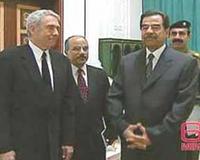
 [In Washington, White House spokesman Ari Fleischer dismissed the Saddam interview as "60 minutes of lies, deceptions and propaganda." Fleischer said the interview included one notable lie by Saddam -- that Iraq's Al Samoud 2 missiles don't exceed U.N. limits. Fleischer said that U.N. weapons inspectors have declared the weapon's range to be greater than the allowed 90 miles.]
[In Washington, White House spokesman Ari Fleischer dismissed the Saddam interview as "60 minutes of lies, deceptions and propaganda." Fleischer said the interview included one notable lie by Saddam -- that Iraq's Al Samoud 2 missiles don't exceed U.N. limits. Fleischer said that U.N. weapons inspectors have declared the weapon's range to be greater than the allowed 90 miles.] Translator for Saddam Hussein: We hope that the attack will not take place. But we are bracing ourselves to meet such an attack. To face it. You’ve been here for a few days, you see how people live. They live normally, they get married, they visit each other, but at the same time they hear the news. The officials in America keep talking about attacking Iraq. And it’s normal that the people prepare themselves for such a possibility. At the same time they are praying to Allah to stop the Americans from going through with it and to spare the Iraqis from the harm that those on the bandwagon of evil want to inflict upon them.
Translator for Saddam Hussein: We hope that the attack will not take place. But we are bracing ourselves to meet such an attack. To face it. You’ve been here for a few days, you see how people live. They live normally, they get married, they visit each other, but at the same time they hear the news. The officials in America keep talking about attacking Iraq. And it’s normal that the people prepare themselves for such a possibility. At the same time they are praying to Allah to stop the Americans from going through with it and to spare the Iraqis from the harm that those on the bandwagon of evil want to inflict upon them.
 <---(Hans Blix) Translator for Saddam Hussein: No violation has been made by Iraq to anything decided by the United Nations. If the intention is to rewrite those resolutions, then we will be entering a new framework. A framework in which the United States will be made to forsake its own position and take a new road towards harming Iraq. In the interview, Saddam Hussein gave no indication he will capitulate to an ultimatum from Chief Weapons inspector Blix -- to begin destroying the missiles by this weekend. Indeed he hinted he will not. Saddam also rejected Bush Administration allegations that besides the missiles delivery system he still has weapons of mass destruction. Translator for Saddam Hussein: I think America and the United States and the world also knows that Iraq no longer has the weapons. And I believe the mobilization that's been done was in fact done partly to cover the huge lie that was being waged against Iraq, about chemical, biological, and nuclear weapons. That is why, when you talk about such missiles, these missiles have been destroyed. There are no missiles that are contrary to the prescription of the United Nations in Iraq. They are no longer there.
<---(Hans Blix) Translator for Saddam Hussein: No violation has been made by Iraq to anything decided by the United Nations. If the intention is to rewrite those resolutions, then we will be entering a new framework. A framework in which the United States will be made to forsake its own position and take a new road towards harming Iraq. In the interview, Saddam Hussein gave no indication he will capitulate to an ultimatum from Chief Weapons inspector Blix -- to begin destroying the missiles by this weekend. Indeed he hinted he will not. Saddam also rejected Bush Administration allegations that besides the missiles delivery system he still has weapons of mass destruction. Translator for Saddam Hussein: I think America and the United States and the world also knows that Iraq no longer has the weapons. And I believe the mobilization that's been done was in fact done partly to cover the huge lie that was being waged against Iraq, about chemical, biological, and nuclear weapons. That is why, when you talk about such missiles, these missiles have been destroyed. There are no missiles that are contrary to the prescription of the United Nations in Iraq. They are no longer there. 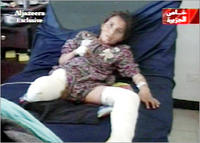
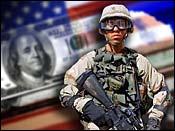
 civilizations of humanity, will not finish just like that even though a huge power may want it to be like that. No
civilizations of humanity, will not finish just like that even though a huge power may want it to be like that. No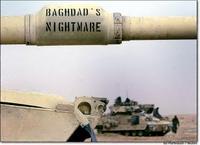 body, nobody should accept that Iraq will finish in such a way.
body, nobody should accept that Iraq will finish in such a way.